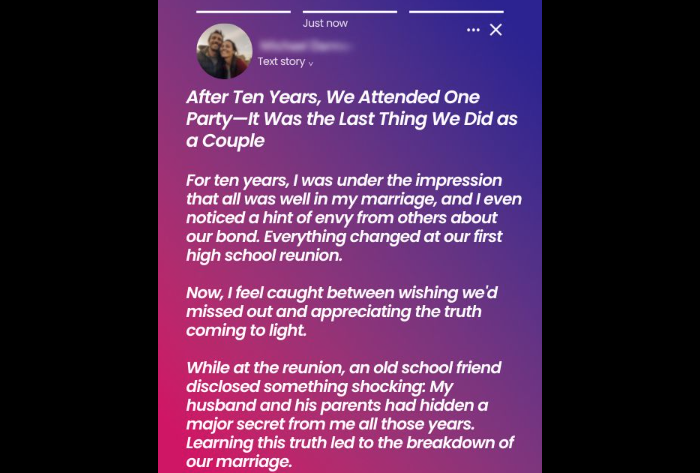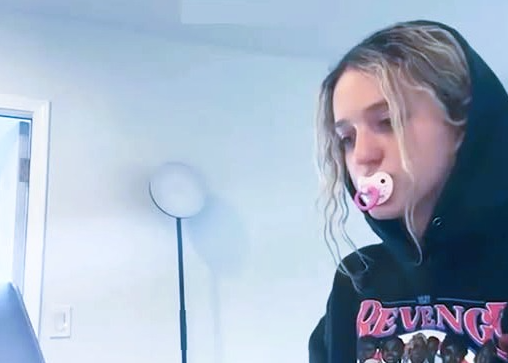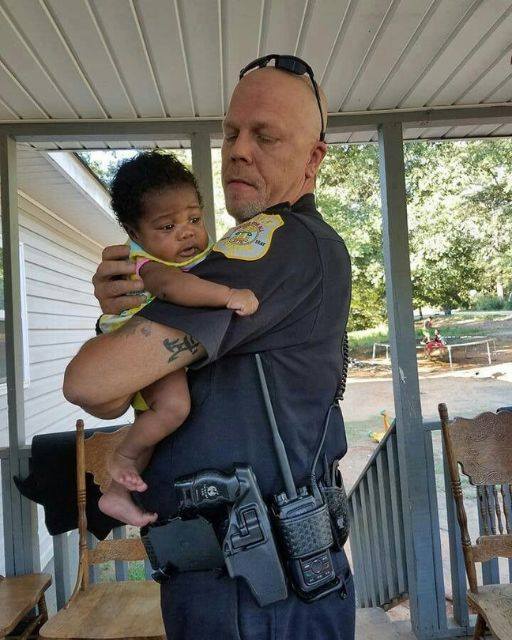For a decade, I believed my marriage was a beacon of harmony, admired by friends and family who saw our connection as something special. That perception shattered at our first high school reunion, an event that would redefine my understanding of love and trust.
Now, I find myself torn between regretting that we attended the reunion and valuing the clarity it brought. During the event, a longtime friend revealed a startling truth: my husband, along with his parents, had concealed a significant secret from me throughout our marriage. This revelation unraveled the life we had built together.
I can still picture the moment it happened. We stood near the punch table, chuckling over memories of high school antics, when Megan, a mutual friend from childhood, leaned close and murmured, “Did you ever hear about the trust fund?” Her words stopped me cold. “What trust fund?” I replied, my tone laced with curiosity and a creeping sense of unease.
Megan paused, then shared the details. Apparently, my husband’s parents had established a substantial inheritance for him during his college years, with the explicit condition that it remain hidden from his spouse. She had only recently learned of it through a chance conversation with his father at a charity gala. The ground seemed to vanish beneath me. Ten years of marriage, and I had been oblivious to a monumental part of his life.
That night, sleep eluded me. My mind replayed Megan’s words relentlessly, each cycle tightening the knot in my stomach. The issue wasn’t solely the money—it was the deliberate choice to keep me in the dark. We had shared countless moments—gifts exchanged, vacations planned, late-night conversations, joint decisions—yet this enormous secret had been carefully guarded from me.
The following morning, I approached him cautiously, hoping for some explanation that would ease my turmoil. “Can we discuss something important?” I asked, stirring cream into my coffee. His expression tightened briefly, but he nodded. I inhaled deeply and recounted what Megan had told me. He remained silent for an uncomfortably long time, staring out the kitchen window, his hands clutching his mug.
“I didn’t think it was relevant,” he said at last. “It wasn’t meant for you—it was something my parents insisted on. I didn’t want to deceive you, but it wasn’t mine to disclose.” His words felt scripted, hollow. As he spoke, I sensed a growing distance between us, one I hadn’t noticed before. Our shared life, which I thought was open and honest, was built on carefully curated omissions, and the foundation now felt fragile.
For weeks, the secret cast a shadow over us. I began examining everything—bank records, old emails, offhand comments about finances. Small details he had dismissed now seemed like clues to a larger puzzle. When I pressed him on why he hadn’t shared the truth, he said, “I didn’t want to ruin what we had.” But the damage was already done. Trust, I learned, cannot be restored with explanations alone, especially after a decade of quiet erosion.
We tried to carry on as if nothing had changed. We attended family gatherings, celebrated milestones, and even took short weekend getaways. But the joy was different—muted, strained. I realized that pretending wouldn’t heal the wound of betrayal. I faced a choice: continue living in the shadow of deceit or step into the unknown, even if it meant letting go.
The decision was agonizing. One rainy morning, I packed a small suitcase, each item heavy with grief and resolve. I had loved him deeply, cherished the life we had created. But love cannot thrive on secrets that reshape the essence of a partnership. I left a note on the kitchen counter, plain and truthful: “I need to rediscover myself outside of us. I hope one day we can talk as friends.” Then I stepped out into the rain, letting it soak through me, as if it could wash away years of illusion.
In the weeks that followed, I settled into a modest apartment in the heart of the city. The urban bustle was overwhelming at first, but it carried a strange liberation. I reconnected with old friends, took long walks through nearby parks, and began volunteering at a community center. With each passing day, I rediscovered pieces of myself—the woman I had set aside to fit into someone else’s world.
One evening, about a month later, he appeared at my door. I was wary, unsure of his intentions or my own feelings. He didn’t come with defensiveness or justifications, only a quiet recognition of the rift his secrecy had caused. We spoke for hours, not about the trust fund, but about the years we spent striving to make each other happy and the ways we had unintentionally hurt one another. That conversation didn’t mend everything, but it offered a sense of closure.
Months later, I bumped into Megan at a cozy café downtown. She asked how I was holding up, and I realized I could smile without his shadow looming over me. “I’m learning that some truths, no matter how painful, can set you free,” I told her. She nodded, her eyes reflecting a deeper understanding.
Then came an unexpected turn. Several months after our separation, I received a call from his parents. They expressed regret for their role in the secrecy and informed me that I had been an unintended victim of their decision. As a gesture of amends, they offered to share part of the trust fund with me. I was taken aback, but after reflection, I declined. My peace didn’t depend on their wealth. It was a quietly empowering moment—validation not through money, but through their acknowledgment of the truth.
Life continued to unfold. I threw myself into my career, joined a book club that met weekly at a local library, and enrolled in a weekend painting workshop, something I had always wanted to explore. Bit by bit, I rebuilt my identity. I learned that trust extends beyond honesty in small matters; it demands openness in the moments that matter most, even when it’s difficult. More importantly, I learned to trust myself again.
A year after our separation, I received a message from him. He had relocated to another city for a new job and wanted to share that he finally understood what he had lost. His words carried sincerity, stirring a mix of sorrow and relief. I had loved him deeply, and perhaps a part of me always would, but that love no longer shaped my world. I responded briefly, wishing him well. There was no resentment, only a calm acceptance that our paths had parted.
Reflecting now, I see our high school reunion as both an ending and a beginning. It closed a chapter built on concealed truths, but it opened a path toward self-discovery, independence, and authenticity. The pain was not something I’d wish on anyone, but I value the strength it revealed. Truths, no matter how difficult, serve as a guide toward lives that are genuine and fulfilling.
The lesson I hold close is clear: love should never demand ignorance, and trust, though delicate, teaches us the power of clarity when it breaks. Truth, even when it stings, is a gift—it offers the chance to rebuild on a foundation that is authentic, not merely comfortable.
If you’ve ever faced a revelation that upended your world, you understand the void it creates—but also the strength found in reclaiming your path. Share this story if it speaks to you, and let others know that even in the wake of betrayal, there is a road to freedom and self-discovery.




